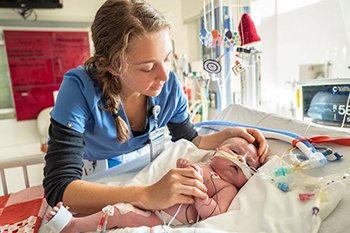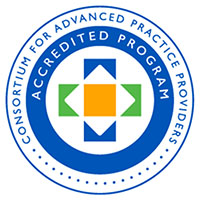New Graduate Neonatal Nurse Practitioner Fellowship
 Welcome to the Seattle Children’s New Graduate Neonatal Nurse Practitioner (New Grad NNP) Fellowship! Our mission is to provide board certified new graduate NNPs the post-Master's/Doctorate degree support, education, training, and skills they need to become successful and confident neonatal advanced practice providers. Our fellowship is a 12-month clinical and didactic training program with rolling entry of cohorts starting throughout the year.
Welcome to the Seattle Children’s New Graduate Neonatal Nurse Practitioner (New Grad NNP) Fellowship! Our mission is to provide board certified new graduate NNPs the post-Master's/Doctorate degree support, education, training, and skills they need to become successful and confident neonatal advanced practice providers. Our fellowship is a 12-month clinical and didactic training program with rolling entry of cohorts starting throughout the year.
-
Prerequisites
Prior to acceptance to the New Graduate NNP Fellowship, the new graduate NNP applicant must meet the following requirements:
- graduated from an accredited NNP educational program
- Master’s degree or Doctoral degree in Nursing
- NCC board certified
- licensed in WA state
-
Facilities
New Graduate NNP Fellows will, initially, spend their time at one of the level III community sites in the SCH regional neonatology program before some independent practice. In the last half of the year, they will rotate through another level III NICU or at Seattle Children’s level IV NICU to experience surgical care and increased complexity of patients. This will help establish a solid foundation as a neonatal advanced practice provider before moving to another site.
- Providence Regional Medical Center, Everett, WA
- Valley Medical Center, Renton, WA
- St. Joseph Medical Center, Tacoma, WA
- Seattle Children’s Hospital, Seattle, WA
-
Curriculum
Onboarding and welome
The New Grad NNP will attend Seattle Children's Hospital onboarding activities and will be welcomed by the Neo APP leadership. Initial resources will be shared. An initial pre-program survey and skills checklist will be sent to the New Grad NNP to identify and self-identified areas of interest or need, as well as gap analysis.
Clinical rotations
The New Grad NNP will rotate to at least two sites over the 12-month period beginning in one of the level III NICUs. New Grad NNP fellows will always have experienced neonatal APP mentors with them who will guide them through expected clinical competencies. Neonatal new Grad NNP fellows begin with a small patient load and are expected to progress on patient load and acuity each month. By months 4-6 and 10-12, the neonatal new grad NNP fellow will be taking an entire APP patient load daily with the mentor acting as a support person, providing minimal guidance as needed.
New Grad NNP fellows spend 30-40 hours in clinical training each week on 12-hour shifts. The New Grad NNP fellow will begin on day shift and will be expected to progress to a combination of day and night shifts by three months into their clinical training. Towards the end of training Neonatal APP fellows are able to train to 24-hour shifts.
Formal clinical evaluations are performed monthly by APP fellowship faculty.
Didactics
Twice-a-month didactic classes, with the PA neonatal fellows, with focus on support of practical application of critical thinking through case-based review of neonatal problems. These topics include complex fluid and electrolyte management; blood gas interpretation and ventilator management; difficult conversations involving the New Grad NNP fellow in the new role; and other complex cases.
The foundational theory is based upon “From Novice to Expert” (Benner, 1984). A case-based, systems approach is valued and participants are asked to present one formal case-based topic to their peers to educate others and reiterate the value placed on mentorship and teaching, by all, at this academic institution.
Classes are led by one of the neonatal APPs with sub-specialist guest speakers including dermatology, biomedical engineering, developmental services, nephrology, neurosurgery, vascular access service, ethics and more. The goal for the sub-specialist guest speakers is to include content related to complex neonatal problems that may not have been part of their educational curriculum in the NNP academic programs.
The New Grad NNP fellows will be provided with online resources, including a handbook with resources for each site. There will also be a didactic assignments to structure the discussion about their experiences. Fellows will be required to present informal case presentations as well as one formal case presentation at the end of fellowship.
Procedural skills
A gap analysis upon hiring will identify any specific procedural skill needs because of lack of opportunity during the NNP educational program. During clinical rotations, the New Grad NNP fellow will be mentored in and will become competent in the following procedures and more:
- Intubation
- Umbilical line placement
- Chest tube insertion
- Needle thoracentesis
- Lumbar puncture
- Peripheral arterial line placement
- Peripheral IV placement
-
Faculty Members
-
Current New Grad NNPs
- Sam Green
- Chanel Chu
- Haley Baker
- Linda Poole
- Ariella Roberts
-
How to Apply
New Graduate NNPs are welcome to apple at any time through our Careers page.
New Graduate NNP fellows are selected based upon assessed qualities of academic achievement; neonatal nursing experiences; desire for learning; previous professional activities and contributions; ability to work a flexible schedule at various clinical sites; and confidence.
 Contact us
Contact us
Email
[email protected]
